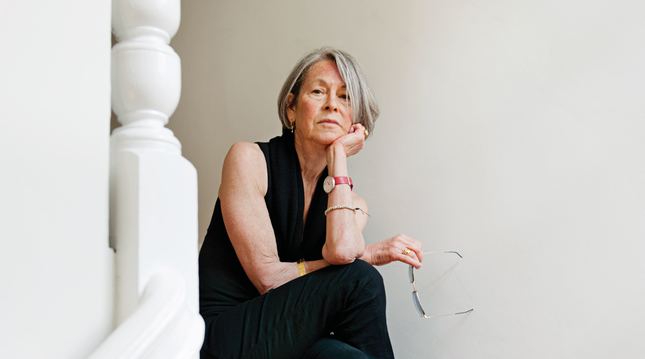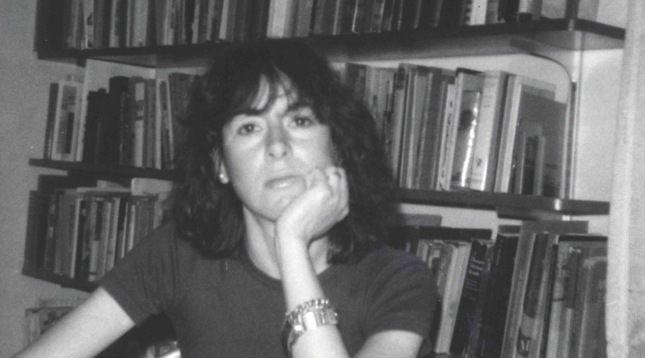
Webb Chappell
Louise Glück was born on April 22, 1943. She worked and taught at Yale.
View full image

Webb Chappell
Louise Glück was born on April 22, 1943. She worked and taught at Yale.
View full image

Lois Shelton/© 1978 Arizona Board of Regents

Lois Shelton/© 1978 Arizona Board of Regents
I had of course heard the name Louise Glück while I was still a student in the early 1990s, but somehow, despite her fame even then, I probably hadn’t read more than a poem or two. I do, however, remember the exact moment when I realized she was a literary force to be reckoned with.
In 1998, my wife, then an MFA student at the Ohio State University, was teaching a spring-quarter undergraduate poetry workshop. For the final assignment of the term, she asked the students to memorize any poem they wanted from the broad anthology Contemporary American Poetry, edited by A. Poulin, Jr., which included work by dozens of poets: from Ai, John Ashbery, and Gwendolyn Brooks to Richard Wilbur and James Wright. On the last day of class, each student was to recite the poem they had chosen. That morning, the 18 students were seated around a large, wooden seminar table, and 12 of them—completely
independent of each other—had chosen the same poem. One after another, they hesitantly uttered the title “Mock Orange,” and with a touching yet awkward earnestness, as if discovering—collectively and individually—what poetry can do to make things blaze with significance, they spoke the words: “It is not the moon, I tell you. / It is these flowers / lighting the yard . . . .” Nancy Kuhl, my beloved, stopped at a campus bookstore on her way back to the apartment and bought as many collections of Louise’s work as we could afford on our then-meager income.
As fate would have it, barely a decade later, Nancy would become the curator chiefly in charge of Louise’s archives at the Beinecke Library; I would become Louise’s colleague in the English department. We became friends; we gossiped and kvetched; we abetted and aided the skipping out of events. She preferred small meals with close conversation. Neither reclusive nor shy, she preferred specificity over surface. The first week of classes this semester—before we had any idea of the cancer—I asked if she would want a celebratory festival when the time came for her to retire, but she wanted a series of small dinners of groups of four people over several days. We joked, a lot. She had a quick, sardonic sense of humor that would have wrested envy from Samuel Beckett. Any time she laughed, you felt like you had really earned it. None of this prepared us for her death, which came far too quickly. But then, what would have?
Louise Glück, Yale’s Frederick Iseman Professor in the Practice of Poetry, died on October 13 at the age of 80. Before coming to Yale in 2004, she had taught at Williams College. She had been raised on Long Island, and the legend is true: her father really did popularize the X-Acto knife. Despite that upbringing in the environs of New York City, it was New England that became her adopted and spiritual home—northern Vermont and Cambridge, Massachusetts. In fact, after living away from the Montpelier area for years, she bought a house there in 2021, and it brought a new excitement and pleasure, a joy, that was touching to witness.
One of Louise’s gifts as a poet and as a person was for making space for the new, even if her routines were steady and steadying, consistent and constant. This allowed for the unexpected to seem actually surprising rather than merely random. Experiencing the unexpected was one of the reasons she loved teaching so much. In an interview with the New York Times in 2020, she explained her devotion to the classroom and her students in just such terms: “You’re constantly being bathed in the unexpected and the new. You have to rearrange your ideas so that you can draw out of your students what excites them.”
Author of 14 books of poetry—including Ararat, Averno, The Wild Iris, and Winter Recipes from the Collective—Louise had a career unlike anyone else’s. Her debut collection, Firstborn, appeared in 1968 and though she would later tend to distance herself from that book, it nevertheless established her. It is no overstatement to say that she is one of the most lauded and most influential lyric poets of the last one hundred years. From 2003 to 2004, she served as US Poet Laureate. She won the National Book Critics Circle Award (1985), the Pulitzer Prize (1993), the Bollingen Prize (2001), the National Book Award (2014), the National Humanities Medal (2015), and then, in 2020, the Nobel Prize in Literature. At times, it seemed that people were creating poetry awards just so they could give them to Louise.
As impressive as these awards and her achievements are—and they are undeniably a dazzling list of accomplishments—the poems are ultimately what made her such a crucial figure. The word “austere” has frequently been attached to her poems, yet I have never been persuaded that it is the best descriptor. The language is precise, yes, and the poems avoid adjectives and any traces of what Ezra Pound might call an “emotional slither” of adornment and sentimentality, but there wasn’t any of the moral severity we might associate with the word “austere.” I would say “specific,” “particular,” the language certainly chosen, yet not riveted in place. “Alive,” she might want me to say. Also: at times, disarmingly witty.
In a telling passage from her magnificent long poem “October,” she writes, “It is true there is not enough beauty in the world. / It is also true that I am not competent to restore it. / Neither is there candor, and here I may be of some use.” These lines present a whole poetics: the poet can’t restore a perception of the beauty of the world, but she can practice openness and frankness and directness. Usefulness is itself a value. Enacting that openness—and let’s not overlook the intrinsic humility there—makes such insight accessible to others as well. By that, I don’t mean just the product of insight, but also the process of insight: what becomes communicable. We do turn to poems for some reason after all—not just for confirmation or consolation. This way of being—frank, candid, unblinking—brings us closer to the perception of beauty than a gaudy, self-conscious decoration of things. And what is beauty? Nothing like merely being lovely—hence the precision of her lines—and something more like the feeling of sudden sight, sudden psychological and emotional recognition of being.
If that is the case, then a poet’s task in writing a poem, she once wrote, is to treat “the self as a laboratory, in which to practice, master, what seem to you central human dilemmas.” It wasn’t the act of expressing one’s interiority or the catharsis of autobiographical confession that drives her poems. She had a brilliance for finding anew in classical myths those “central human dilemmas” that are as urgent as they are irresolvable. Telemachus, Persephone, Demeter—all these and other figures loomed large in her imagination of an inescapably human and emotional landscape. Ultimately, she realized, and helped us bear in mind, that the gods were made in our image—their flaws and frustrations, their resentments and yearning and tendernesses, were all ours.
To get at the core of these stories was to discover the self and how it reveals itself, how it covers its tracks. Not just her self, but selfhood itself. “I look for archetypal experience,” Louise said in an interview just after winning the Nobel, “and I assume that my struggles and joys are not unique. They feel unique as you experience them, but I’m not interested in making the spotlight fall on myself and my particular life, but instead on the struggles and joys of humans, who are born and then forced to exit. I think I write about mortality because it was a terrible shock to me to discover in childhood that you don’t get this forever.” And so if mortality was Louise’s ongoing subject, why do I feel such surprise at her death? Even as an adult, it remains a shock that we don’t get life forever.
“We’re all born mortal,” Louise once pointed out in an interview, and so, consequently, “we have to contend with the idea of mortality. We all, at some point, love, with the risks involved, the vulnerabilities involved, the disappointments and great thrills of passion. This is common human experience,” she insisted. It may be in fact what makes us human.
There is a tendency to say that in the face of such a devastating loss there are no words. That isn’t altogether true. We do have the words; in fact, all we have are words. It is perhaps more accurate to say that in such times we feel most keenly, most intensely, the need to use language to express all we are capable and incapable of saying. We find, then, confronting loss and grief, not the limitations of language, but our own limitations in getting words to be as awake, as alive, as quickened with emotion and thought as we need them to be—as we need ourselves to be. We have words. We have, for example, her words, her candid words. In poem after poem, for decades, Louise Glück’s poems have shaped a sense of how to be in the world, of how to be in love with the world and even, when the time comes—as it will, as it must—how to face leaving it. Now we have to face the world without Louise in it. In that, at least we are not alone.
Read four of Louise Glück’s poems on the next page.
 loading
loading